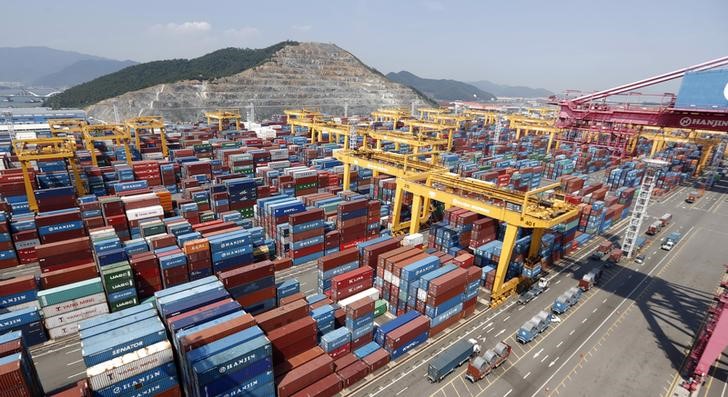(Bloomberg) --
The coronavirus pandemic will hammer South Korea’s exports more than the financial crisis did, prompting a major rethink of global supply chains, according to the country’s top trade official.
“It’ll be tougher than 2008 when it was primarily about financial shocks in developed economies. Now this is an entire world suffering a demand shock as well,” said Sung Yun-mo, Korea’s trade, industry and energy minister, in an interview last week.
The export sector will suffer deeper and longer-lasting pain, but the realignment of supply lines could also end up favoring South Korea as companies look for more secure sourcing of parts, Sung added.
With Korea’s exports seen as a barometer for global trade, Sung’s comments suggest economies around the world need to brace for a harder trade hit from Covid-19 and a wave of factory relocations that will present both risks and opportunities.
Exports are the backbone of South Korea’s economy. Overseas shipments fell last month by the most since the financial crisis, resulting in the first trade deficit since 2012. The country’s gross domestic product already shrank 1.4% in the first three months of the year and worse is expected this quarter.
In response, the government has pledged more than 240 trillion won ($197 billion) in spending, loans and guarantees to shore up the economy.
“It’s not an easy decision, but if your industries die, you won’t have any revenues, so it’s a choice that the government has to make,” Sung said, acknowledging that the pace of rising debt could eventually become a concern.
President Moon Jae-in has also unveiled what he calls a “Korean-style New Deal” centered on state-led investment in artificial intelligence and fifth-generation wireless networks to boost growth and jobs once the pandemic subsides.
That vision will include system semiconductors, primarily used to calculate and process data, because they are essential to artificial intelligence, said Sung. The sales of system semiconductors rose to a record in March even as memory-chip shipments slid, according to government statistics.
The widespread economic shutdown first imposed by Beijing could prompt businesses to re-evaluate their reliance on China as a supplier, Sung said.
Korea may not match the kind of price competitiveness that China and other Southeast Asian nations offer, but its successful campaign to bring the coronavirus under control without the need to lock down the economy has renewed investors’ confidence in its ability to bounce back and provide key supplies in a crunch, he said.
“The global value chain that has formed around efficiency and costs will now reshape around resiliency and reliability,” Sung said.
The pandemic may also prompt more nations to accelerate efforts to bring factories home in a so-called re-shoring strategy, but the costs of doing that cannot be ignored, Sung said.
He cited General Motors (NYSE:GM) as an example of a foreign company reluctant to pull out of Korea because of the abundance of local suppliers that can provide the whole range of components needed for an automobile.
Speed is another strength for South Korea, he said. When China shut down swathes of its economy during the first quarter, South Korean petrochemical companies were able to quickly divert their exports to the U.S. and Europe, he said.
“The pandemic is an opportunity for South Korea to consolidate its position as a control tower in Asia supplying core parts and materials,” he said.
©2020 Bloomberg L.P.
